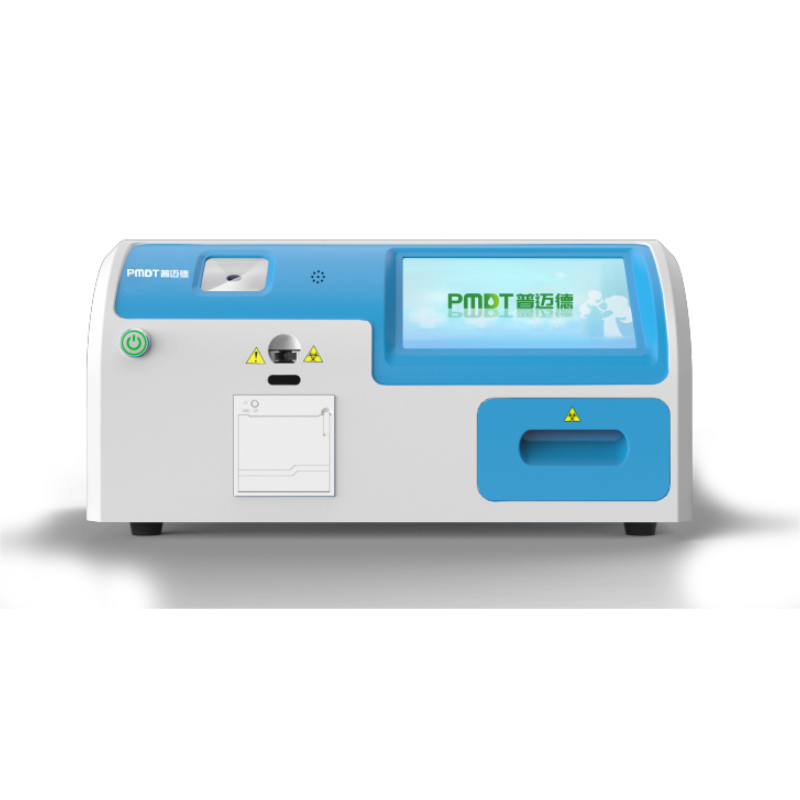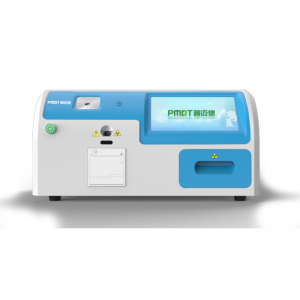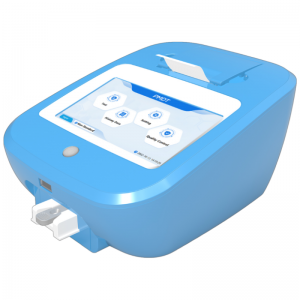Fluorescence immunochromatography analyzer
Intended Use:
PMDT 9000 Immunofluorescence Quantitative Analyzer is an analyzer for processing and analysis of PMDT test kits including markers for cardiovascular diseases, renal diseases, inflammation, fertility, diabetes mellitus, bone metabolism, tumor, and thyroid, etc. PMDT 9000 is used to measure concentration of biomarkers in human whole blood, serum, plasma or urine samples. The results can be used as an aid in clinical diagnosis of laboratory and point of care testing. It is applicable in Emergency, Clinical Lab, Outpatient, ICU, CCU, Cardiology, ambulance, operating room, wards, etc.
better designed POCT
more accurate POCT
★ steady structure for reliable results
★ auto alert to clean polluted cassettes
★ 9’screen, manipulation friendly
★ various ways of data exporting
★ full IP of testing system and kits
★ high-precision testing parts
★ independent testing tunnels
★ temperature & humidity auto-control
★ auto QC and self-checking
★ reacting time auto-control
★ auto-saving data
more accurate POCT
more intelligent POCT
★ high-throughput for gargantuan testing needs
★ testing cassettes auto-reading
★ various testing samples available
★ fitting in many emergency situations
★ capable to connect printer directly (special model only)
★ registered QC for all testing kits
★ registered QC for all testing kits
★ real-time monitoring of every tunnels
★ touch-screen instead of mouse and keyboard
★ AI chip for data management
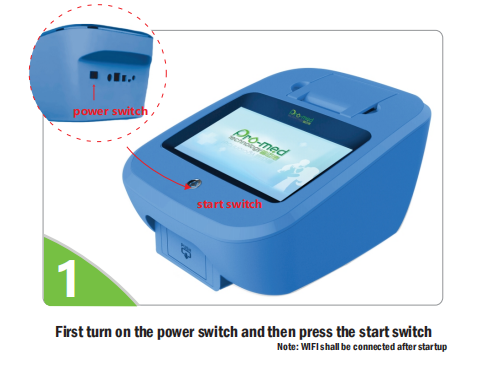
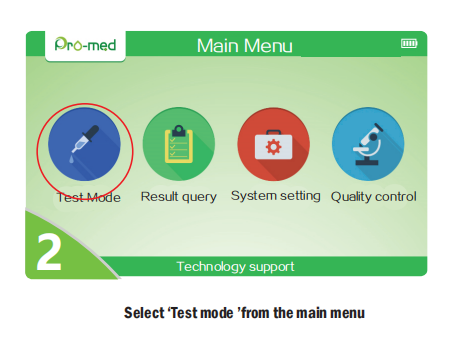
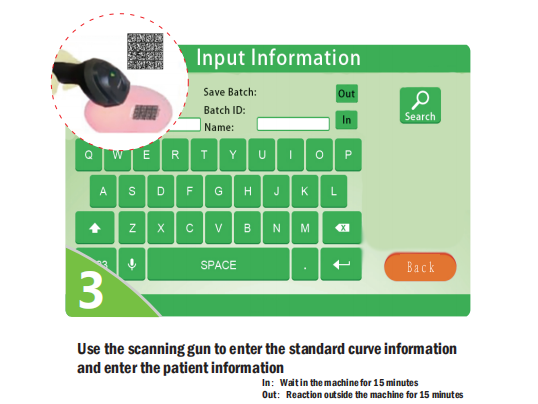
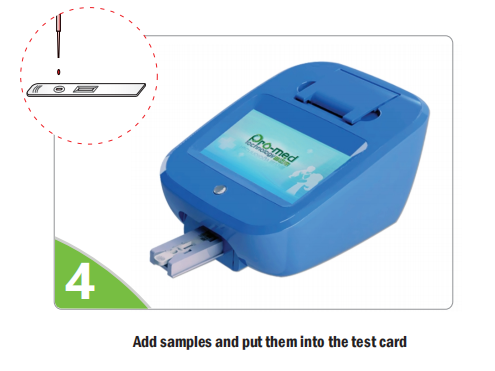

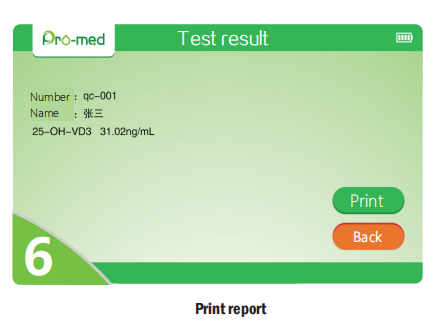

Internal medicine Dept.
Cardiology / Hematology / Nephrology / Gastroenterology /Respiratory
Anti-coagulation and Anti-thrombotic management in patients with coronary heart disease, myocardial infarction and cerebral infarction.
Bleeding and coagulation monitoring in in patients with hemophilia, dialysis, renal failure, liver cirrhosis and gastrointestinal bleeding

Surgical Dept
Orthopedics / Neurosurgery / General surgery / Alcohol / Transplantation / Oncology
Coagulation monitoring in pre-, intra- and post-operation management
Evaluation of heparin neutralization

Transfusion Dept / Clinical laboratory Dept / Medical examination center
Guide the Component Transfusion
Improve the blood coagulation detection methods
Identify the high-risk thrombosis / bleeding cases

Interventional Dept
Cardiology Department / Neurology Department / Vascular Surgery Department
Monitoring of Interventional therapy, thrombolytic therapy
Monitoring of individualized antiplatelet therapy
| Category | Product name | Full name | Clinical solutions |
| Cardiac | sST2/NT-proBNP | Soluble ST2/ N-Terminal Pro-Brain Natriuretic Peptide | Clinical diagnosis of heart failure |
| cTnl | cardiac troponin I | Highly sensitive and specific marker of myocardial damage | |
| NT-proBNP | N-Terminal Pro-Brain Natriuretic Peptide | Clinical diagnosis of heart failure | |
| BNP | brainnatriureticpeptide | Clinical diagnosis of heart failure | |
| Lp-PLA2 | lipoprotein associated phospholipase A2 | Marker of vascular inflammation and atherosclerosis | |
| S100-β | S100-β protein | Marker of blood–brain barrier (BBB) permeability and central nervous system(CNS) injury | |
| CK-MB/cTnl | creatine kinase-MB/cardiac troponin I | Highly sensitive and specific marker of myocardial damage | |
| CK-MB | creatine kinase-MB | Highly sensitive and specific marker of myocardial damage | |
| Myo | Myoglobin | Sensitive marker for heart or muscle injury | |
| ST2 | soluble growth stimulation expressed gene 2 | Clinical diagnosis of heart failure | |
| CK-MB/cTnI/Myo | - | Highly sensitive and specific marker of myocardial damage | |
| H-fabp | Heart-type fatty acid-binding protein | Clinical diagnosis of heart failure | |
| Coagulation | D-Dimer | D-dimer | Diagnosis of coagulation |
| Inflammation | CRP | C-reactive protein | Evaluation of inflammation |
| SAA | serum amyloid A protein | Evaluation of inflammation | |
| hs-CRP+CRP | The high-sensitivity C-reactive protein +C-reactive protein | Evaluation of inflammation | |
| SAA/CRP | - | Virus infection | |
| PCT | procalcitonin | Identification and diasnosis of bacterial infection, guiding the application of antibiotics | |
| IL-6 | Interleukin- 6 | Identification and diasnosis of inflammation and infection | |
| Renal Function | MAU | Microalbumininurine | Risk evaluation of kidney disease |
| NGAL | neutrophil gelatinase associated lipocalin | Marker of acute renal injury | |
| Diabetes | HbA1c | Hemoglobin A1C | The best indicator to monitior the control of blood glucose of the diabetics |
| Health | N-MID | N-MID OsteocalcinFIA | Monitoring therapeutic treatments of Osteoporosis |
| Ferritin | Ferritin | Prediction of Iron deficiency anemia | |
| 25-OH-VD | 25-Hydroxy Vitamin D | indicator of osteoporosis (bone weakness) and rickets (bone malformation) | |
| VB12 | vitamin B12 | Symptoms of vitamin B12 deficiency | |
| Thyroid | TSH | thyroid stimulating hormone | Indicator for the diagnosis and treatment of hyperthyroidism and hypothyroidism and the study of the hypothalamic-pituitary-thyroid axis |
| T3 | Triiodothyronine | indicators for the diagnosis of hyperthyroidism | |
| T4 | Thyroxine | indicators for the diagnosis of hyperthyroidism | |
| Hormone | FSH | follicle-stimulating hormone | Assist in assessing ovarian health |
| LH | luteinizing hormone | Assist in determining pregnancy | |
| PRL | Prolactin | For pituitary microtumor, reproductive biology study | |
| Cortisol | Human Cortisol | Adrenal cortical function diagnosis | |
| FA | folic acid | Prevention of fetal neural tube malformation, pregnant women/newborn nutrition judgment | |
| β-HCG | β-human chorionic gonadotropin | Assist in determining pregnancy | |
| T | Testosterone | Assist to evaluate the endocrine hormone situation | |
| Prog | progesterone | Diagnosis of pregnancy | |
| AMH | anti-mullerian hormone | Evaluation the fertility | |
| INHB | Inhibin B | Marker of remaining fertility and ovarian function | |
| E2 | Estradiol | The main sex hormones for women | |
| Gastric | PGI/II | Pepsinogen I, Pepsinogen II | Diagnosis of gastric mucosa injury |
| G17 | Gastrin 17 | Gastric acid secretion, gastric health indicators | |
| Cancer | PSA | Assist in the diagnosis of prostate cancer | |
| AFP | alPhafetoProtein | Marker of liver cancer serum | |
| CEA | carcinoembryonic antigen | Assist in the diagnosis of colorectal cancer, pancreatic cancer, gastric cancer, breast cancer, medullary thyroid cancer, liver cancer, lung cancer, ovarian cancer, urinary system tumors |
Immunofluorescence is a type of assay performed on biological samples to detect specific antigens in any biological specimen or sample and vice-versa. It was described in 1942 and refined by Coons in 1950, which used a fluorescence microscope able to read the specific immunological reaction and cellular slide preparations.
Principle of Immunofluorescence
Specific antibodies bind to the protein or antigen of interest.
Antibodies could be labeled with molecules that have the property of fluorescence (fluorochromes)
When light of one wavelength falls on fluorochrome, it absorbs that light to emit light of another wavelength.
The emitted light can be viewed with a fluorescence analyzer


